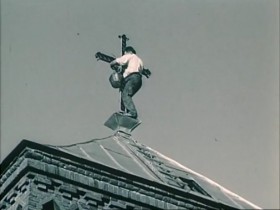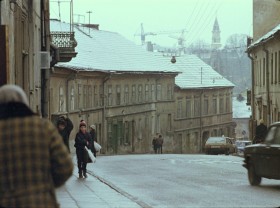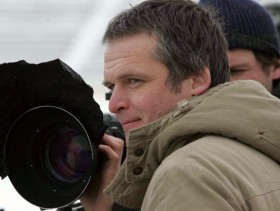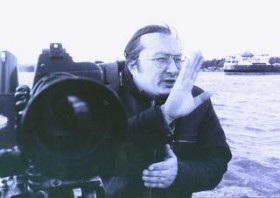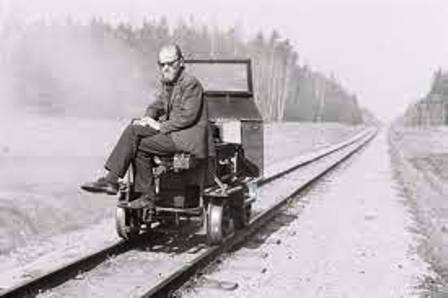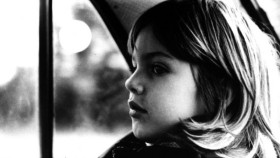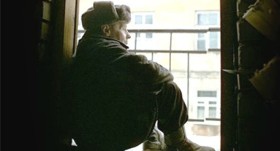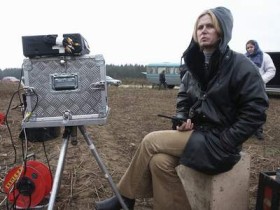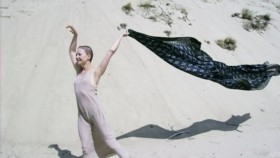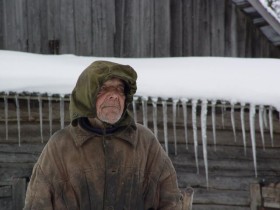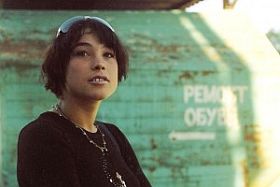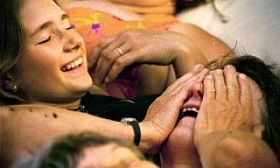Giedre Beinoriute had a wonderful clip with children talking about existential questions: She had – contrary to many documentary directors today – a clear idea of narrative style wanting to film the kids on an empty background with two cameras building the story as an essay. Giedre Zickyte presented a powerful clip on the late Lithuanian photographer Luckus, who killed a man and himself in 1987, being more or less banned from his own country. His widow, lifving in the US, has opened the archive for the director to tell the touching story of their life and giving evidence of the bohemian artist scene in Moscow in the USSR in the 60’es and 70’es. (From a blogpost 16-09-2010)
An early christmas present for documentary lovers: The offer to watch artistic short documentaries from the country of filmmakers who, if any, master the poetic film language: Lithuania. In times where these kind of films have problems in getting to the big festivals, that more and more select by subject – political and social – the initiative deserves a huge BRAVO! It comes from DocAlliance, the excellent online portal for Video on Demand offering permanent access to 400 outstanding documentaries selected by the five partner festivals (Leipzig, Nyon, Copenhagen, Warsaw, Jihlava). Twenty new films are added monthly and these can be acquired through streaming or download.
This offer for free streaming of Lithuanian docs runs until the 28th, i.e. this upcoming Sunday. If you want more information – Filmkommentaren has written about Arunas Matelis 12 times, Audrius Stonys 24 times – the two masters, whose works (at least some of them) you can watch, and as for the film “Man-Horse” by Audrius Mickevicius you will find an enthusiastic review. IF you don’t have time to watch the films now, you can do it later by paying a cheap fee. The selection of films for video-on-demand is done with competence.
A meditative film poem full of rhyming images about movement, old age and the human body.
…Young producer Dagne Vildziunaite from Lithuania was very convincing in her presentation of a film about ”The Father”, a seventy year old former criminal (in Soviet times), who in his late years has settled down in the countryside to lead a true and honest family life. The production company (”Just a Moment” has shot the film and the producer was in Barcelona to seek interest and look for fresh eyes, an editor who can complete the film. In the audience several editors queued up to help to get the film to a rough cut stage – enabling several of the broadcasters to make a pre-buy. (From a blogpost 06-02-2011)
MANTAS KVEDARAVICIUS:
BARZAKH
At the Summer Media Studio in Neringa Lithuania, a European Film Student Workshop, that goes on until July 17, with editing as the theme, ending up with 10 short documentaries, it was very appropiate to show the awarded Lithuanian documentary from Chechnya, ”Barzakh”. Lithuania, small country with around 3 million inhabitants, has a tradition for making films that have been characterised as ”poetic realism”, with Arunas Matelis and Audrius Stonys as well known names in the international documentary circle. The film by Mantas Kvedaravicius is no exception from that label, and after two very well deserved awards at the Berlinale, ”Barzakh” is now travelling the world of festivals.
Stasys Baltakis, teacher at the Lithuanian Academy of Music and Theatre, the film school of the Country, introduced the film and its director. ”He is not a film director, he is a thinker”, he said about the debutant Kvedaravicius, who made the film over a period of years, now completing his PhD (and a book) on the affects of pain. And the film is about pain, about people in Chechnya, families whose members disappear or have undergone torture. Shot illegally, and with one year in the editing, the film expresses pure love and respect for the characters without turning to sentimentalism. ”Our life stands still” says the mother of Hamdan, who disappeared 6 years ago without any sign given to the family, and with loads of papers written to the authorities with no result. In a very slow and tense rythm the film makes the audience experience how life goes on. It has to. The camera catches magical moments inside the houses, the characters tell their stories of pain and torture, mainly off the picture, car trips give the narrative a flow andinformation about how a devastated city looks, at the same time as the Russian authorities have done a lot to lighten up mosques and other buildings. Pure facade for the invisible violence, it seems. While watching the film you sense a growing anger and sadness witnessing the life of people, who wait and hope.
Barzakh is a metaphor used in the film visually. This is how the director – on the film’s website – describes the phenomenon: Barzakh is a theological concept that comes from the Quran and has been elaborated by Sufi scholars. It loosely defines, through the metaphor of water, the space between life and death. At the same time the term is not merely a metaphor, but rather a paradigm on which the film is built. That is, it does not simply indicate that life in Chechnya is like Barzakh, or that because of its relation to Sufism, which is the predominant religious practice in Chechnya, it is a widely used local concept. Rather its main purpose is as a guiding principle, to distinguish the peculiarities of life there and to show how they link together and connect us into other spaces and temporalities.
Lithuania, 2011, 57 mins. PS. The film has, as many other important documentaries in these years, been supported by the Finns, the company of Aki Kaurismäki and YLE and Finnish Film Foundation. (Blogpost 06-07-2011)
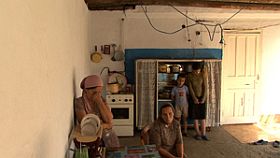
Mantas Kvedaravicius: Barzakh
DAGNE VILDZIUNAITE ON BALTIC SEA FORUM
Lithuanian producer Dagne Vildziunaite took part with two very promising projects. One is ”Toys” about people in a small Belorussian city. The young director Lina Luzyte showed me a rough cut (around 70 minutes) of the film – very promising it was, a new talent from a strong documentary country. The other film project brought by Vildziunaite was ”Father” that is being edited right now, a former criminal, 20 years in jail, 13 children, ”an insatiable lust for life”. Director Marat Sargyan. (From a blogpost 12-09-2011)
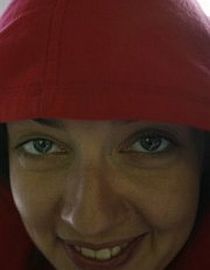
A LETTER FROM DAGNE VILDZIUNAITE
Lithuanian producer Dagne Vildziunaite writes after the Baltic Sea Forum in Riga – a perfect follow-up to the doc-discussion on this site:
I usually say it was nice to meet you again. But this time I want to say a bit more. During five hours trip home (from Riga to Vilnius, ed.) I got into melancholic mood and realized it is exactly 4 years after the first time I “came on the international documentary stage”. It was also in Riga I was pitching ANTIS by Giedre Z, the project I sometimes thought we would never be able to finish…
All I remember from that time was me shaking in front of Nick Fraser from BBC.
This year I came back with an almost finished film, with two beautiful new projects (“Toys” and “Father”, ed.), with more hopes than fears and with much better understanding what documentary filmmaking means to me. I think I have found the way and I am 100% sure I would never had done it without the support by the wonderful tutors I have. Let me be a bit emotional and confess how happy I was to see your proud faces while us making confident speeches. I felt like delivering final words after getting university diploma and feeling inspiring smiling eyes of my two professors (hmmm, Mikael Opstrup and Tue Steen Müller, ed.). I feel a constant deep need to make you feel proud of us, to feel how worthy your work and support for me and for many others is.
I may sound like a small girl waiting for confirmation that she is nice and good. But the reality is I’m travelling, pitching for quite a long time, still have not received any CEs’ support but every day I wake up with a stronger and stronger believe about what I’m doing.
And even more – this time after the meetings with all the CEs, after talking and looking in their eyes, I really understood they are not simple ” free travellers”.
They are people who do care (no matter if they have money or not) and I think this is something exceptional that makes our documentary community alive under any conditions. We are like a small country that suffers the most during any crisis but at the same time is the most united and resistant.
We have our strong inside discussions, arguments and disappointments about each other, but we all together are searching for the way how to survive. I guess it is because we all – filmmakers, funders, CEs – all are in love with our babies “documentaries” and we simple can not imagine we could live without them. I am sure we’ll meet very soon again! (Blogpost 17-09-2011)
HENRIKAS SABLEVICIUS
They know how to remember and honour their artists in Lithuania, including the documentary filmmakers, I was reminded again today at the Vilnius Documentary Film Festival. Talking to directors Giedre Beinoriute and Audrius Stonys, they told me that a film club had been established in the name of Henrikas Sablevicius, a wonderful teacher and a fine documentary director, a father figure, for many the main creator of the Lithuanian documentary tradition, based on the image, always with many layers, lyrical in tone, like the city Vilnius often filled with an atmosphere of spirituality.
Henrikas Sablevicius (1930-2004) came to the Balticum Film & TV Festival on the Danish island of Bornholm in all 10 years of the festival’s existence. He was the proud leader of the delegation, he was the one who stood forward and made speeches and introductions, he invited the audience to retrospectives of Lithuanian documentaries, including some of his own, and he was a generous party organiser after the screenings at the Kino Gudhjem on Bornholm. He was also the one, who received us, the Danish selection team, when we came to Vilnius to watch films. He organised the screenings at the Film Studio in the city (torn down, what a shame!) and he served us tea and 999, the secret code that later became the way that I and director Arunas Matelis for years adressed each other.
I got a book on Sablevicius today, published last year, edited by Ramune Rakauskaite, entitled ”Soble” (his nickname), with contributions from colleague filmmakers and students like the three names I have mentioned. I can not read it, but just browsing through the book looking at the photos of the charismatic man with the wild beard, brings me back to our meetings on Bornholm, always with conversations that included an interpreter… Sobles Kino Klubas is the name and it has a facebook page! (Blogpost 30-09-2011)
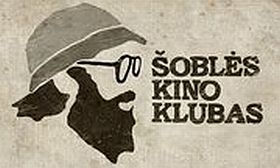
MINDAUGAS SURVILA: THE FIELD OF MAGIC
After the award ceremony of the 8th Vilnius Documentary Film Festival , a new Lithuanian documentary had its premiere in Vilnius. ”The Field of Magic” has been on its way for years and premieres in a version that is full of magnificent images and love for the characters in the film. The production company Monoklis, their director and the two producers Jurga Gluskiniené and Giedrè Beinoriuté, call the film a docu-poem, it could also be labelled as a docu-adventure. It starts and closes with images of moose who live in the forest, where also the characters have settled outside the normal society close to the dump ground where they pick metal to be sold. To have sufficient income to survive the way they want, and do, with dignity.
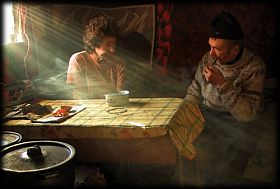
I can not call this a review, I am biased, I have followed the film during the development process at the Ex Oriente training workshop, organised by IDF (Institute of Documentary Film), I have even been visiting the wonderful people in the film, taken there with Audrius Stonys and the director Mindaugas Survila. I have watched material and given advice.
Not a review, but I can say that the honesty and respect and warm generosity, shown by Mindaugas Survila during the whole process, his loyality to the characters and their trust in him – all that is in a stylistically balanced film that is universal in its theme and humanity. It would be natural that it travels around the world to festivals and – maybe – to tv stations that still dares to challenge its audience with something for the thought and heart. (Blogpost 02-10-2011)
LINA LUZYTE’S BELARUSSIAN TOYS
One day when she was travelling in Belarus, Lithuanian film director Lina Luzyte woke up in her train, that had stopped at a station in the town of Zhlobin. She looked out the window and saw a lot of people lined up to sell plush toys to the passengers…
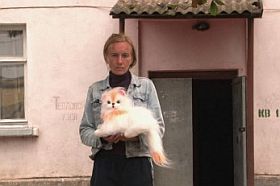
It became a film, that will premiere in 2012 – and will have a strong festival presence. I can say so as I have seen rough cuts of the film, which is more than promising, and is the first feature documentary of Lina Luzyte, whose producer is Dagne Vildziunaite, company: Just a Moment.
Look out for the film (working title: Belarussian Toys) when it comes near you. Here is a quote from the IDF website (see below) interview by Hana Rezkova. Luzyte says:
… When I was passing the town, what caught my sight was an image – a face of a man holding a crocodile next to his head. Both faces next to each other. The man’s face was really sad and the crocodile was very beautiful. At that moment I understood that the toys will be the key element, not only visually but also on the level of meaning. The process was actually the opposite. While I was there I stopped distinguishing them from the rest of the reality. They were not standing out anymore. And in the editing room I realized that they have very sad eyes. One of my protagonists told me that there are Polish eyes, German eyes, Russian eyes, and Belarusian eyes. All the eyes have eyelashes leaning towards both left and right. Only the Belarusian eyes have eyelashes directed to one side only. (Blogpost 18-12-2011)
http://www.dokweb.net/en/
BALTIC DOCUMENTARIES AT ZAGREBDOX
This is a text I wrote for the ZagrebDox catalogue 2012: The films that you are going to watch from Estonia, Latvia and Lithuania are the finest examples from a cinema that has, from country to country, its own individuality and its own individuals. You will meet films by young and old talents, some with quite a track record, nationally and internationally. Directors with a vision, both in terms of theme and aesthetics.
The selection for this retrospective programme of documentaries from the three Baltic countries have been done with a focus on the last 10 years, omitting not only films from the last century but also films from 2010 and 2011 – some from these years were already shown at ZagrebDox.
Allow me to be personal to say that the relation between me and the Baltic documentary is a pure love story, which started in the year 1990 when the Soviet empire was falling apart. In Denmark we started a film festival on the island of Bornholm where filmmakers from the countries surrounding the Baltic Sea came to present their works. The festival went on for 10 years and we travelled to Tallinn, Riga and Vilnius to select the film. In this century I have continued to visit the countries to scout for films other festivals and to take part in the Baltic Sea Forum, where new film projects are being pitched.
What we met way back in 1990, was of course a documentary tradition that was based on the Soviet tradition – and on its way to break with the very same. In Estonia the leading figure was Mark Soosaar (whose beautiful, personal film ”The Home for Butterflies” is part of the retrospective), in Latvia the names were Juris Podnieks, Ivars Seleckis and Herz Frank, in Lithuania Henrikas Sablevicius was the grand inspirator and teacher for the young generation.
The films in the early 90’es dealt with the newly gained freedom and loads of film came out that had a historical focus on the brutalities of the Soviet occupation. Later on there was a change towards current issues, and a change of format, not to forget, leaving the short documentaries meant to be screened in cinemas to go for longer films, that eventually could appeal to European broadcast formats. Many filmmakers, who had been employed during Soviet times, had difficulties in adapting to the free market economy, at the same time as independent production companies were established making the job of a producer important.
When I first got acquainted with the Baltic documentaries, I imagined that the films were more or less the same in tone and aesthetics from country to country. They are not, as you will be able to experience in the programme.
Going from the North, Estonia has definitely a sense of humour that could resemble the neighbours in Finland. For sure the films of Manfred Vainokivi (”Jolly Old Farts”) and Maimik and Jaak Kilmi (”The Art of Selling”) will make you smile in their own original style, whereas Mark Soosaar and Kersti Uibo represent a personal auteur style.
In Latvia it was obvious to bring in a film by Laila Pakalnina, a master of the short documentary, always thinking in images more than in words, as demonstrated beautifully with multi-layered ”Dream Land”. Her younger colleagues, the cameraman Maris Maskalans and director Andis Miziss, made another visually brilliant man & nature film ”Roof on the Moonway”, and for two other films presented I chose to go for the theme of art and creation. Theatre and film director Viesturs Kairiss, reintroduces “Romeo and Juliet” and David Simanis, for me the most shining star in modern Latvian documentary, follows the same Kairiss in his work with Wagner, and gives his own interpretation in “Valkyrie Limited”.
Lithuania, the most Southern country of the three, is the mostdifferent in a form, that is very much implemented by the well known couple: Audrius Stonys and Arunas Matelis. It is only natural to start the Lithuanian retrospective with their common extravagant hymn to their own country, “Flight over Lithuania”, followed by two films by Stonys (“Alone” and “Uku Ukai” (PHOTO) and one by Matelis, the masterpiece “Before Flying Back the Earth”. Oksana Buraja brings the tradition of the two masters forward with “Diary”, whereas Giedre Beinoriute represents a new generation with her original film on “Grandma and Grandpa”.
Three small countries, suffering the economic crisis of course, but still with strong documentaries in themes and artistic quality. (Blogpost 27-02-2012)
JANINA LAPINSKAITE IN COPENHAGEN
On this site you will find lots of texts that introduce, review and report on documentaries from Lithuania. Another one comes here to tell our Danish readers that Janina Lapinskaite will show some of her films at the Danish Cinemateket tonight thursday 22nd of March and on sunday 24th of March.
I write this having a lot of sweet memories in mind. Lapinskaite was one of the filmmakers who most often visited the Balticum Film & TV Festival on the island of Bornholm, in the middle of the Baltic Sea. The festival that took place 1990-2000 and took back some prizes.
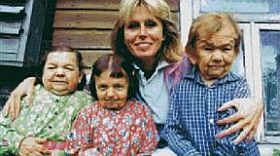
”From the Life of the Elves” (1996) (photo with director) is a fairy tale documentary presenting three grown up dwarfs living in the countryside in their own little world guarded by an old lady. The film that later was bought for distribution at the National Film Board of Denmark (at that time Statens Filmcentral, now the Danish Film Institute) and for Danish DR/TV introduces the special style of Lapinskaite, who later made films like ”Venus with a Cat” (1997) that reconstructs the painting of Manet, ”The Luncheon on the Grass” and ” The Life of Venecijus and the Death of Caesar” (2002) about a man and his pig, not to forget the 2009 work ”The Train stops for Five Minutes”.
Lapinskaite, who is principal of the Lithuanian film school, The Academy of Music, and has acted in fiction films of her husband, Aligimantas Puipa, is as her colleagues Audrius Stonys and Arunas Matelis, a true representative of what has been called the Lithuanian school of poetic documentary, with a focus on outsiders, artists of life you could say, in her country. (Blogpost 22-03-2012)
VILNIUS DOCUMENTARY FILM FESTIVAL 2012
The 9th edition of the documentary fest in the capital of Lithuania takes place September 20-30. The opening film is Carlos Klein’s fine documentary Where the Condors Fly about Viktor Kossakovsky shooting his masterpiece Vivan las Antipodas. A prologue to a retrospective of the director’s work giving the audience the chance to watch great films like Belovs, Wednesday and Sviato – and of course Vivan las antipodas.
The festival has a strong competition programme with four films from each of the Baltic countries. From Estonia there are The New World by Jaan Tootsen and This is the Day by Kersti Uibo, the latter ”captures the flow and simple beauty of daily life in a monastery standing on a hill above the Serbian village of Velika Hoca in Kosovo”, to quote the webiste of the festival. From Latvia Laila Pakalnina comes with two works, Snow Crazy and 33 Animals of Santa Claus, and from the hosting country you find Giedre Zickyte’s How we Played the Revolution, Ramin by Audrius Stonys, Mindaugas Survila’s The Field of Magic (photo) and Goda Rupeikaite’s Variations on a Subject of Masks.

Furthermore there is a programme of films on beat poets and philosophy (Burroughs, Kerouac abd Ginsberg), and a panorama section with works like Planet of Snails and Private Universe by Helena Trestikova. All in all, an impressive artistic orientated selection. As last year where I was in the jury in Vilnius. (Blogpost 15-09-2012)
PURE CINEMATIC LANGUAGE
The festival, Docu Days 2013 is over, awards were given last night, again the Red Hall in the Cinema House in Kiev was packed with primarily a young audience full of enthusiasm. I was in the Docu/Life jury where we (Russian critic Lyubov Arkus, director Audrius Stonys and I) watched seven films of high quality, to give two special mentions and one Jury Prize. The mentions were given to Romanian Noosfera by Ileana Stanculescu and Artchil Khetagouri and to Latvian The Documentarian by Ivars Zviedris and Inese Klava. The motivations go like this:
Noosfera: A warm intimate close-up portrait of the excentric Nico, who as a scientist and a teacher conveys his look on the future of the world and love, trying to adapt his vision to his own life. The directors show great talent for catching everyday life situations and originality with respect and humour.
Documentarian: A hilarious and intelligent film about filmmaking, it raises all basic questions on the relationship between the one who films and the one who is being filmed. Inta is a film star, clever in her analysis of the film that
Ivars is doing, at the same time as she shouts her way to the hearts of the audience, and out of her loneliness. She is a bitch, a witch and a darling!
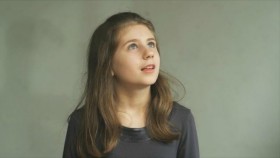
The first prize we decided to give to Lithuanian Giedré Beinoriūtė for her ”Conversations on Serious Topics” (photo). Motivation: … a film that through pure cinematic language and with respect and love takes us to the inner life of children and youngsters. You learn about life from this visually poetic film, you experience how we from the grown-up world treat our kids, but you also see how they are able to express their vision for a better world. (From a blogpost 28-03-2013)
VISION DU RÉEL 2013
… the winner of the Prize for best medium length, ”Father” (photo) by Marat Sargsyan, I have followed from the sideline – this is what was written in February 2011 after the pitching at DocsBarcelona:
Young producer Dagne Vildziunaite from Lithuania was very convincing in her presentation of a film about ”The Father”, a seventy year old former criminal (in Soviet times), who in his late years has settled down in the countryside to lead a true and honest family life. The production company (”Just a Moment”) has shot the film and the producer was in Barcelona to seek interest and look for fresh eyes, an editor who can complete the film. In the audience several editors queued up to help to get the film to a rough cut stage – enabling several of the broadcasters to make a pre-buy.
The film is now finished and the producer wrote to me on her way to the award ceremony: The next stop for “Father” will be Krakow, also competition section. But not sales agents yet, cause “it is another dark story from Eastern Europe that TV audience is tired of”. Let’s hope Visions Du Reel result will change something.
I share that hope – come on sales agents, this is a film for an “ordinary” documentary interested audience all over! (Blogpost 27-04-2013)
NEXT DOOR IS A MUSIC CONSERVATORY
The Baltic Sea Pitching Forum ended Sunday afternoon. On the second day the hall on the 11th floor of Hotel Albert in Riga was again full of filmmakers, observers and a panel of tv editors, fund people and sales agents/distributors.
After the session I met some Estonian film students, who had attended and enjoyed the two days. I asked them for their favourite projects and they mentioned two: ”Biblioteka” by Ana Tsimintia from Georgia and ”Five” by Italian director Maximilien de Joie, a project presented by Lithuanian producer Dagne Vildziunaite.
These youngsters represent a coming audience and I thought that Heino Deckert, veteran German producer and director, again had demonstrated a good nose for what might work internationally by showing interest to help precisely these two projects. Deckert had fine helping colleagues around the table, let me just mention some of them – Shanida Scotland from BBC’s Storyville, who always analysed in a precise and constructive way, Anaïs Clanet from Wide House in Paris and the French/Belgian sales agent and promoter Thierry Detaille, who both left with projects to help out, not to forget Russian Grigory Libergal, who, if anyone, knows the possibilities in the big neighbouring country.
Let me give you the description of the film project ”Five”:
“In the central avenue of Vilnius there is a palace, and behind the neo classical style facade, there used to be the Lithuanian KGB headquarters and it’s prison. Today, that building is the museum of LIthuanian Genocide Victims. Tourists from all over the world walk trough the entrance with a smile and curiosity, and leaves with shocked and stunned faces. Just like one of those tourists, an Italian filmmaker decided to make a documentary on this topic. After a tour in the basement of the museum, where the prison used to be, he decided to meet the people whose lives were bound by KGB during the last decade of Soviet Union. This film is a collage of five characters that were taking clashing positions, a collage of their reminiscenses and experiences. Its a provocative invitation to infiltrate theirs consciences and to perceive their attitute, an experience that can be inspiring with its positivity, but frightening by it’s own truth, that might be misbecoming for someone.”

Maximilien de Joie: Five
Let me add what I always remember when passing the building, told to me by Lithuanian director Audrius Stonys: Next door to the prison building was/is a music conservatory, so when the prisoners were sitting in their cell, music came to their comfort. (Blogpost 09-09-2013)
VILNIUS DOCUMENTARY FILM FESTIVAL 2013
The core of the festival is still the competititon programme that consists of films from the Baltic countries. Among the four Estonian films you find Sulev Keedus strong ”The Russians on Crow Island”, in the Latvian section you find ”The Documentarian” by Ivars Zviedris and Inese Kjav, and the superb ”Chronicles of the Last Temple” by Davis Simanis. From the hosting country Lithuania – five films to be presented – two films stand out: Giedre Beinoriute’s ”Conversations on serious Topics” and ”Igruski” by Lina Luzyte.I was there two years ago and was impressed of a good programme and had it not clashed with other obligations, I would have enjoyed to go to wonderful Vilnius for some days during the festival, that runs from September 19-29.
All in all good films to be watched by a jury that includes Leonard Helmrich, the director who has given us the outstanding trilogy from Indonesia ”In the Eye of the Day” (2001), ”Shape of the Moon” (2004) and ”Position of the Stars” (2010) (photo), all films to be offered the festival audience. New York Times called him “master of impossible camera angles”.

Classics from Lithuanian documentary history have been restored and are presented at the festival with names that have appeared frequently on this blog: Audrius Stonys and Arunas Matelis from the 90’es and Henrikas Sablevicius and Robert Verba from the 60/70’es…. and there is a Panorama of new documentaries in the rich programme. (Blogpost 14-09-2013)
THE AWARDS
The Vilnius Documentary Film Festival ended Saturday night and the jury headed by Leonard Helmrich, whose films were shown in a retrospective series, gave out the awards in the Baltic documentary competition, this year with a very strong line-up of films.
Difficult to object to the main award going to Davis Simanis from Latvia for his ”Chronicles of the Last Temple” (photo), a superb interpretation of the new and much discussed National Library of Riga, a film that shows Simanis ability to capture thegrandeur of a building and its details in a super aesthetic form.
Second prize to wonderful “The Documentarian” by Ivars Zviedris and Inese Klava, also from Latvia, and third prize to Lithuanian “Father” by Marat Sargsyan.
And then some great news from the hosting country, Lithuania, that has decided the following, according to the internet magazine FilmNewEurope: “The minimalist Lithuanian documentary Conversations on Serious Topics directed by Giedre Beinoriute is the latest of the announced entries for the Oscar race for Best Foreign Language Film. The film, produced by Monoklis www.monoklis.lt and shot in a spare style with children speaking on subjects ranging from disability, the existence of God, violence, love, and work, is among a number of films from Central and Eastern Europe vying for an Oscar nomination.” (Blogpost 01-10-2013)
LINA LUZYTE: IGRUSHKI (2013)
The 1st international documentary film festival in the Caucasus runs from 15-20 October. The organiser is the Noosfera Foundation supported by – among others – the Idfa Bertha Fund and Georgian National Film Center.
The festival has an International Competititon section as well as a Focus Caucasus, a Georgian Panorama and a CinéDoc Young.
For the International section 10 films have been picked. According to the organizers, they are ” artistic, inspiring, daring in form and storytelling”. I would add that the list of films (check the website) is wonderfully different from the usual documentary festival programmes, spreading from the original ”The Other Day” by Chilean Ignaciao Agüero to heartbreaking Russian ”Linar” by Nastia Tarasova and the impressive, by the bigger festivals, overseen no-Lukashenko-in-picture-documentary from Belarus, ”Igrushki” by Lina Luzyte from Lithuania. More known in the festival circuit are titles like Moroccan Karima Zoubir’s strong ”Camera Woman” and Polish Pawel Kloc’s masterpiece ”Pnomh Penh Lullaby”. (From a blogpost 04-10-2013)
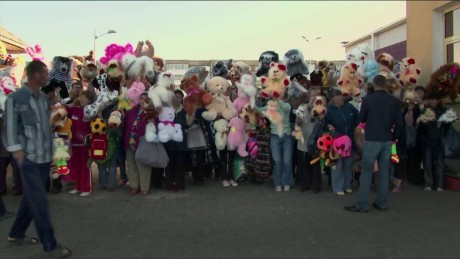
Lina Luzyte: Igrushki
A MOTIVATION
The Main Award at the 1st Cinedoc Tbilisi festival went to Lina Luzyte for her ”Igrushki”. The motivation of the Jury of the International Competition:
THE FIRST PRIZE IS AWARDED – BY A UNANIMOUS JURY DECISION – TO A DOCUMENTARY THAT IS SET IN AN ENVIRONMENT WHERE DEMOCRACY IS STILL A MUCH COVETED GOOD AND DAY BY DAY, PEOPLE STRUGGLE TO BUILD A DECENT LIVING.
THE FILM MAKER MANAGES TO CAPTURE THIS STRANGE ATMOSPHERE IN A DOCUMENTARY THAT SURPRISES BY ITS VERY ORIGINAL STYLE AND MANAGES TO GO DIRECTLY TO THE HEART OF THE VIEWER.
THE DOCUMENTARY IS SET IN A PLACE WHERE TIME SEEMS TO HAVE STOPPED AND CREATED AN OWN AND VERY SPECIAL UNIVERSE.
THE JURY APPRECIATED VERY MUCH THE EXTRAORDINARY CINEMATIC STYLE, THE AUTHOR’S EYE FOR DETAIL AND THE COMPELLING STORYTELLING THAT TURNS EVERY SEQUENCE INTO A STORY OF ITS OWN.
THE JURY ALSO APPRECIATED THE RESPECT – EVEN THE LOVE – WITH WHICH THE MAIN CHARACTERS ARE PRESENTED. (Blogpost 20-10-2013)
VILNIUS DOCUMENTARY FILM FESTIVAL 2015
September 17 until 27 it’s again documentary fest time in the capital of Lithuania, Vilnius, a fine event to visit; I was there in 2011 as a juror, with Lithuanian ”Barzakh” by Mantas Kvedaravicius as the winner.
Apart from a retrospective of the Maysles Brothers films and aSpecial Programme with Claude Lanzmann’s ”Shoah” and a couple of other films related to the Nazi time – I saw ”The Decent One” by Vanessa Lapa on Himmler – there is a so-calledMain Programme with ”Amy” by Asif Kapadia and ”Suddenly My Thoughts Halt” by Portuguese Jorge Pelicano (presented this year at Magnificent7 in Belgrade) and a Competition Programme, for me the most interesting as it features new Baltic documentaries and indirectly is a witness of the high quality of films from the three countries.
12 films compete and it is a strong list that comes out of the website of the festival. Let me mention those that I have seen:
”The Amateurs” by Audrius Antanavicius (Lithuania), ”The Invisible City” by Viesturs Kairiss (Latvia), ”Anthill” by Vladimir Loginov (Estonia), ”Beyond the Fear” by Herz Frank and Maria Kravchenko (Latvia), ”Master and Tatyana” by Giedre Zickyté (Lithuania), ”Escaping Riga” by Davis Simanis (Latvia) and ”Gates of the Lamb” by Audrius Stonys.
The latter, whose film career I have followed since we met at the Balticum Film & TV Festival on Bornholm in the beginning of the 1990’es, when he – together with Arunas Matelis – were the young talents of Lithuanian documentary, asked me some time ago what I thought of ”Gates of the Lamb” and its festival potential. These were my words:
This film, which is visual, have very few words, uses music, has no “story” as such but lets us enjoy Faces Faces Faces, mostly in profile at the right part of the image – great cinematography – and music and a solemn atmosphere with fine small humoristic sequences with children with open faces not really understanding, and yet… what is going on. You are back to a world that you master to convey.
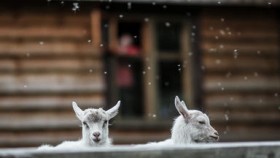
I have no information if “Gates of the Lamb” has been to other festivals so far, but to have it here in the hometown of the director is an obvious choice.
I mentioned 7 films, among the 5 that I have not seen, are new works by Lithuanian veteran Rimantas Gruodis and Latvian Laila Pakalnina, who seems to do a couple of films per year! (Blogpost 13-09-2015)
MY GREATEST DOCS EVER
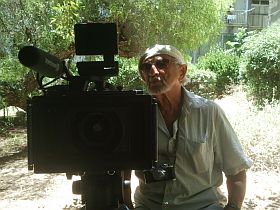
Herz Frank
So this is my choice for the Sight & Sound “The Greatest Docs Ever”. I have chosen films that I have used in my work as a teacher and consultant, films that I have come back to because they have meant something to me. I have been influenced by meetings with the directors – Herz Frank, Lozinski, Kossakovsky, Apted, Glawogger, Matelis – and by reading about and listening to clever words by Leacock and Pelichian, not to forget Lanzmann. What the films all have in common, I think, are a belief in the values of Life how hard and unfair it may be to you. A humanistic fundament, can you say so? 6 of the films are from the Eastern part of Europe where I have been working quite a lot and from where most of the original, artistic documentaries come.
Those which are multi-layered, philosophical, essayistic in a Chris Marker-way, sketchy and close to the term “camera comme stylo”. To be stressed: This is a personal choice, if I had gone through film history decade after decade it would have been different.
1.Ten Minutes Older
Herz Frank
1978
It’s all there. The story of our lives. To be read in the face of a boy. An intellectual, concepedy documentary with Juris Podnieks as cameraman, “the story of good and evil” as the subtitle goes. I have shown it wherever I go to introduce that documentaries must be reflective and philosophical.
2. Shoah
Claude Lanzmann
1985
No words necessary, an obvious choice and Lanzmann’s follow-up “The Last of the Unjust” is an appendix that shows that the director/journalist is still able to add quality to documentary film history.
3. Anything Can Happen
Marcel Lozinski
1995
Playful and clever interpretation of what Life and Death, Joy and Sorrow is – the director’s charming son runs around in a park, where he meets old people and ask them all kind of questions in a direct way that we grown-ups would never dare. The result is touching and great fun at the same time.
4. The Belovs
Viktor Kossakovsky
1994
I could have taken the director’s last masterpiece, Vivan las Antipodas, as well but this film from the countryside of Russia brilliantly depicts the Russian soul as we have experienced it in works of Dostoyevsky and Thechov.
5. Man With a Movie Camera
Dziga Vertov
1929
When you get bored of formatted documentaries, this is the one to make you trust the power of the documentary language, the joy of Life, the enthusiasm of what the new medium is able to achieve, innovative and playful, pure pleasure, to watch without music, please!
6. 7UP
Michael Apted
1964 –
It’s like watching yourself… wonderful hymn to human lives… you follow the characters with so much interest and empathy, you cry and laugh with them, it’s a magnificent series, and it also – in its style – is a look at how film and television language has changed through 50 years.
7. Megacities
Michael Glawogger
1998
Few directors have as Glawogger been travelling the world to tell stories about how people live and think and work. This is one of the works from his trilogy (the others are “Workingman’s Death” and “Whore’s Glory”), with a superb cinematography of Wolfgang Thaler, “la condition humaine” is the theme so far away from reportage as one can be.
8. Before Flying Back to the Earth
Arunas Matelis
2005
He comes from the Lithuanian school of poetic documentary, he made several beautiful b/w enigmatic short documentaries but when his daughter got leukemia and was at hospital for months, the director decided to make a film about children in a similar situation and he came up with his magnificent visual poetic homage to how children fight against their serious illness with all they got of courage and humour!
9. Seasons
Artavadz Pelichian
1975
I have never understood Pelichian’s montage theory but this his masterpiece will always attract an audience to see the power of the single image, at the same time as the film is anthropological, have totally abstract, non-figurative sequences, no words, Vivaldi “only”. You are speechless when you have been with peasants and sheep up and down the hills. If you look carefully there are small human stories, happiness and grief.
10. Jazz Dance
Richard Leacock
1954
I had to have Leacock on board… his filmography is extraordinary, his work with Flaherty is unique, his work with the other direct cinema people (Pennebaker, Maysles, Drew) likewise, but I have chosen this one that he himself has talked so well about, where he went bananas in a night club, filmed from the table, a jamming with the camera, a true FREE film. (Blogpost 02-08-2014)
LITHUANIAN DOCS WIN IN VILNIUS
The winners of Vilnius Documentary Film Festival Baltic competition have been appointed and the top two were from the hosting country:
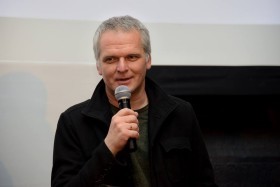
Audrius Stonys
Veteran Audrius Stonys took the first prize for his “Gates of the Lamb” that I have written the following words about: This film, which is visual, have very few words, uses music, has no “story” as such but lets us enjoy Faces Faces Faces, mostly in profile at the right part of the image – great cinematography – and music and a solemn atmosphere with fine small humoristic sequences with children with open faces not really understanding, and yet… what is going on. Audrius Stonys is back to a world that he masters as noone else.
Giedre Zickyté took the second prize for her ”Master and Tatyana” that I have written the following words about: So, there it is, the film about the Lithuanian photographer Vitas Luckus (1943-1987), his life, his art and first of all his love story with muse and wife, Tatyana. It is made by Giedre Zickyte, who has been working on it for years. I heard about it five (maybe more) years ago, when she was pitching the film at the Baltic Sea Forum, and since then I have had the pleasure to watch sequences and rough versions. Yes, pleasure, because Giedre Zickyte has kept the passion for her film the whole way through, and pleasure because you can see Quality, high Quality in the final film. For me it’s brilliant, nothing less… the whole review, click: XXX
The photo of Audrius Stonys thanking for the main award is taken from the FB page of the festival – © Mindaugas Česlikauskas (Blogpost 28-09-2015)
BALTISKE DOKUMENTARFILM I ÅRHUS
En glædelig meddelelse til alle os danskere, der er glade for baltiske dokumentarfilm: Aarhus biografen Øst for Paradis lægger hus til en fire dag lang festival straks i det nye år, 9-12. Januar 2016. Jeg iler med at videregive den velskrevne og kloge pressemeddelelse, som arrangøren Det Danske Kulturinstitut i Estland, Letland og Litauen har sendt ud i dag under overskriften ” BALTIC FRAMES: DOCUMENTARIES CONVERSING WITH THE SOVIET PAST”:
I begyndelsen af januar 2016 skyller en baltisk dokumentarfilmbølge ind over Aarhus’ art cinema Øst for Paradis. Det er første gang, der afholdes en baltisk dokumentarfilmfestval i Danmark i det nye årtusinde, og er dermed en oplagt mulighed for at stifte bekendtskab med dokumentarfilmgenren fra dette nordøstlige hjørne af Europa, der sjældent er på dagsordenen i Danmark.
Det Danske Kulturinstitut i Estland, Letland og Litauen præsenterer i samarbejde med de tre baltiske nationale filminstitutter en vigtig håndfuld af nye baltiske dokumentarfilm med en historisk, kulturel og geografisk spændvidde, der rækker fra Narva i det nordøstligste Estland over Riga, Kaunas og Vilnius med afstikkere til Tjernobyl, Leningrad og Sibirien. Filmene skaber tilsammen et indblik i tiden før, under og efter Sovjetunionen, og netop i 2016 vil det være 25 år siden at Estland, Letland og Litauen løsrev sig fra Sovjetunionen. Foruden de seks film, indgår også et seminar i festivalens program.
Centralt for ’Baltic Frames: Documentaries conversing with the Soviet past’ er temaet ’erindring’ og bearbejdningen af Sovjetfortiden, som dokumentarfilmene på levende, poetisk og personlig vis realiserer. Derudover berøres de ydre omstændigheder som påvirkede modstand, kunst og kultur, men også de indre konsekvenser som opløsningen medførte for bl.a. etniske russere. Den baltiske poetiske dokumentarfilm styrker og aktualiserer kendskabet til den mangfoldighed og kompleksitet, der karakteriserer den region vi i daglig tale, under et, kalder for Østeuropa.
Baltic Frames åbner lørdag d. 9. januar 2016 kl. 19:00 med en fremvisning af et nostalgisk og herligt eksempel på en poetisk kortfilm 10 Minutes Older (1978) af den lettiske instruktør Herz Frank (1926-2013). Samme aften vises den litauiske dokumentarfilm ’Master and Tatyana’ – et intenst portræt af fotografen Vitas Luckus’ liv i Sovjetunionen – om kunsten, kærligheden og en løve, der er instrueret af Giedre Zickyte (f. 1980). Premiereaftenen afsluttes med en reception.

Giedre Zickyte: Master and Tatyana
Søndag d. 10. januar kl. 11-13:00 afholdes seminaret Poetic Baltic Documentaries in a contemporary perspective. Her kan man blive klogere på hvad der sker i det baltiske dokumentarfilmlandskab, når den estiske producer Pille Rünk fra Allfilm (’Crosswind – hvor vindene mødes’), den lettiske producer Uldis Cekulis fra VFS Film (’Klucis’) og den litauiske instruktør Giedre Zickyte i samtale med den danske dokumentarfilmekspert Tue Steen Müller introducerer og stiller skarpt på tendenser, udfordringer og udviklingen af den poetiske dokumentarfilmgenre. Efterfølgende vises de to film ’Klucis – the decontruction of an artist’ og ’Crosswind – hvor vindene mødes’, en feature, der havde premiere i danske biografer i november, men som nu får aarhusiansk premiere. En film, der allerede har fået de fleste anmeldere til at kaste om sig med roser:
“En autentisk dagbog er basis for et unikt filmsprog, der bogstaveligt mimer ufriheden: Alt er fastfrosne tableauer, selv de dramatiske situationer, helt stillestående. Fanger og vogtere er levende, birkens løv bevæger sig, en kjole flagrer i vinden. Men kun kameraet kan bevæge sig.” (Søren Vinterberg, Politiken, 27/11 2015). (Blogpost den 28-12-2015)
GIEDRE ZICKYTE’S MASTER AND TATYANA

So, there it is, the film about the Lithuanian photographer Vitas Luckus (1943-1987), his life, his art and first of all his love story with muse and wife, Tatyana. (Screened at the cinema Øst For Paradis, Aarhus at the festival “Baltic Frames”) It is made by Giedre Zickyte, who has been working on it for years. I heard about it five (maybe more) years ago, when she was pitching the film at the Baltic Sea Forum, and since then I have had the pleasure to watch sequences and rough versions. Yes, pleasure, because Giedre Zickyte has kept the passion for her film the whole way through, and pleasure because you can see Quality, high Quality in the final film. For me it’s brilliant, nothing less… the whole review: Blogpost from 28-09-2015. (Blogpost 11-01-2016)
BALTIC FRAMES AARHUS
The Baltic documentary festival in Aarhus, in the wonderful art house cinema Øst for Paradis (”East of Eden”) took off saturday with a full house screening of the classic ”Ten Minutes Older” by Herz Frank and Lithuanian Giedre Zickyte’s ”Master and Tatyana”. Sunday a seminar entitled ”Poetic Baltic Documentaries in a Contemporary Perspective” was held with Pille Rünk, Giedre Zickyte and Uldis Cekulis as speakers – I had the pleasure of being the moderator of the two hour talk that circled around the theme of ”Conversing with the Soviet Past” the theme of all the films in the festival. Zickyte’s film is mentioned, later on the sunday brought to screen Peteris Krilovs film on Gustav Klucis and Martti Helde’s impressive ”In the Crosswind” that ran in Danish cinemas November last year.
Today, monday, two films were screened, Zickyte’s ”How We Played the Revolution” and Estonian ”The Russians on Crow Island” by Sulev Keedus – tuesday Latvian Viesturs Kairiss is on screen with his Tjernobyl film, ”The Invisible City”.
It is the plan of the main organizer, The Danish Cultural Institute, to continue the festival next year, where Aarhus is one of the European Capitals.

Photo: From the left the curators Niels Bjørn Wied and Signe van Zundert, Head of the Danish Cultural Institute in Estonia, Latvia and Lithuania Simon Drewsen Holmberg, Estonian film producer Pille Rünk, Lithuanian director Giedre Zickyte and Latvian producer Uldis Cekulis. (Blogpost 11-01-2016)
ALBERTI & ZICKYTE: I’M NOT FROM HERE
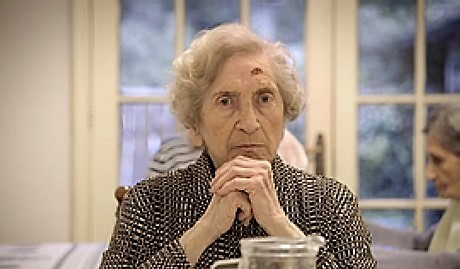
From the production side it is interesting. The film is commissioned by Danish festival CPH:DOX under its program CPH:LAB, where filmmakers from different countries meet to work together. 10 intensive workshop days, original ideas to develop, one year to make the film. I have no idea about the budget but see that there is Chilean as well as Lithuanian funding for this film that is made by Maite Alberti and Giedre Zickyte. A quote from the CPH:LAB page (link below): ”CPH:LAB encourages creative risk-taking, celebrates raw talent, facilitates collaboration across borders andbusiness sectors and supports frontrunners within the film industry to push the existing boundaries of filmmaking as we know it.”
Yes, Chilean Albert and Lithuanian Zickyte have taken the creative risk to make a film that with its minimalistic film language conveys perfectly the situation for the 88 old Basque born Mrs.Josepe, who lives in an old people’s home in Chile, and has done that for almost a year but thinks it is for days and that she can soon return to Renteria, her Basque town near Saint Sebastian. She has to educate some of the other residents about the Basque country, she turns to Basque language on occasions of arguments against the Spanish speaking, she is a proud woman, who also rejects to hold the hand of a 90 year old flirter – and tells a woman next to her in the couch to take care not to fall when she gets up, after which she herself gets up and falls…
Small situations, touching observations like in Alberti’s award-winning “Tea Time”, humour is there, reminds me of Jon Bang Carlsen’s “Before The Guests Arrive” and Eva Stefani’s “In the Box”. Back to the CPH-LAB word “Risk”… well, on the other side you could say that Alberti already showed her skills with the old lady drinking tea, and Giedre Zickyte had her international breakthrough with the film on legendary photographer Luckus in “Master and Tatyana”. On the other side this succesful collaboration would never have happened without the initiative of CPH:DOX.
Best short film at Visions du Réel 2016, the film will have a long festival life, and TV stations, wake up, this is a film with a universal them and a duration that will fit your 26 minutes slots. (Written 23-04-2016)
Chile, Lithuania, Denmark, 26 mins., 2016
AUDRIUS STONYS: THE TRUTH OF LIFE…
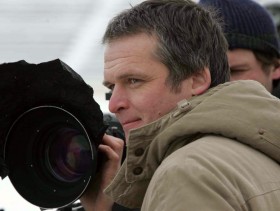
… this is just a natural thing in documentary filmmaking, the moment you think you know everything and it only remains to capture your “discoveries”, the truth of life takes over and turns against you. So, I let my visions be transformed. The essence lies in the quest. Subsequently, the films will live the lives of their own….
Says Audrius Stonys in an interview on cineuropa, very well made by Aukse Kancereviciute. I recommend you to read it all, here is a taster:
The film Ūkų ūkai emerged from a desire to expose the beauty industry, but in the course of shooting your attitude changed radically. Does it often happen that life adjusts preconceived visions?
Perhaps not a single one of my films was unaffected by this. The idea changes, because reality turns it upside down and destroys it. At first I was very frightened; it seemed to me that was it – that was the end. I had an idea and everything took another turn. Then I understood that this was supposed to be so. None of my films are as I originally conceived them. In Ūkų ūkai both the theme and the characterchanged. Instead of a strong, healthy, young man who goes swimming every day irrespective of whether it rains or snows, we have a tiny old woman tip-toeing across her room. Alone (Viena) was supposed to be about a girl who is going to visit her mother, who is in prison, and talking what she sees and feels, but instead I made a completely silent film. New Martyrology (Tas, kurio nėra) was supposed to show a man who died unbeknownst to anybody, but instead the Lithuanian film director Augustinas Baltrušaitis, whom fate and circumstances tossed into complete oblivion, became the protagonist of the film. When shooting Cenotaph it seemed that the film was about the meaning of reburial, but it turned out to be about meaninglessness. The initial concept is therefore diametrically opposite… (Written 25-04-2016)
(Update 05-11-2018, ABN)
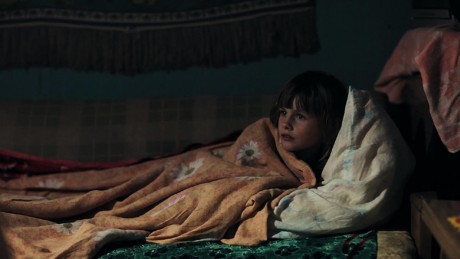
Arunas Matelis:Before Flying Back to the Earth



